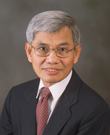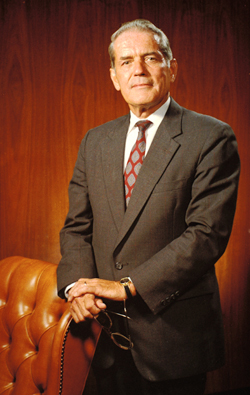|
|
|
|
|
|
 |
|
Wubah steps in as VP, dean of undergraduate education
Daniel A. Wubah, associate provost for undergraduate academic affairs at the University of Florida, has been named vice president and dean for undergraduate education at Virginia Tech.
|
|
| He began his new position Feb. 1, 2009. Wubah succeeds David R. Ford, who retired Dec. 31. As vice president and dean for undergraduate education, Wubah oversees the Office of Academic Support Services, the Office of Enrollment Management, the Office of Distance Learning and Summer Sessions, and the Office of Undergraduate Education. Wubah, who was a professor of zoology at Florida, also will hold a position as professor of biological sciences at Virginia Tech. |
|
Steering committee: no classes to be held
April 16, 2009
The University Steering Committee for the April 16, 2009, Day of Remembrance has recommended that Virginia Tech not hold classes that day. Virginia Tech President Charles W. Steger and Senior Vice President and Provost Mark McNamee have accepted the recommendation. The committee of faculty, staff, students, and family members discussed plans for this year and future years at great length. Regular classes will not be held on Friday, April 16, 2010, either, but the committee is recommending that the day include significant educational activities. A regular class schedule will resume on Monday, April 16, 2012, and on all subsequent class days that fall on April 16. The university plans to continue holding special remembrance events on April 16, regardless of the day of the week it falls on in a given year. For more on this year's events, go to www.weremember.vt.edu.
|
|
| Pritchard hall goes co-ed in 2009-10 |
|
|
| Pritchard Hall, currently the largest all-male residence hall on the East Coast, will transition to a co-ed residence hall in fall 2009. Pritchard will house a mix of 41 percent females and 59 percent males, a reflection of the gender balance of the student population on campus. The hall has housed 1,016 men during the 2008-09 academic year and has housed more than 40,000 men since it opened in 1967. The decision to open the building to female students was based on an increasing demand for co-ed housing and the changing gender balance of the Virginia Tech campus, with a higher number of females in the general population electing to attend college, increasing popularity of Virginia Tech among female students, and a higher number of women choosing to remain on campus after their first year.
 LISTEN LISTEN  Pritchard Hall to allow women. Pritchard Hall to allow women.
|
|
|
|
| Tech, Appalachian School of Law create program
The College of Natural Resources has announced the creation of a joint graduate program with the Appalachian School of Law (ASL), an independent institution established in Grundy, Va., in 1994 to help foster economic growth in Southwest Virginia. The joint graduate certificate program kicked off in the spring 2009 semester. The arrangement gives ASL students access to classes offered through the College of Natural Resources' master of natural resources program and gives Tech students access to classes at ASL. In addition to online distance-learning classes, students are able to take video broadcast classes onsite at the Grundy, Blacksburg, Richmond, and Falls Church campuses. ASL students also will have opportunities for externships in the National Capital Region. This new initiative will allow law students who want to incorporate natural-resources law, policy, and science into their legal studies to earn a certificate of graduate studies in natural resources and/or the master's of natural resources degree in addition to their law degree. In exchange, College of Natural Resources students who are interested in environmental law and public policy will have the opportunity to expand their knowledge by enrolling in selected ASL courses.
|
|
| University rises in Peace Corps annual rankings
 Virginia Tech has risen on the Peace Corps' Top 25 list of large schools producing volunteers for the organization. With 43 alumni currently serving as volunteers, Virginia Tech is No. 24 in the rankings, up one place from last year. Since the Peace Corps' inception, 535 alumni have served as volunteers across the globe. "The Peace Corps relies heavily on the graduates of contributing schools from across the country. Their education and experiences add to the diversity of the Peace Corps and its success in the host countries," says Peace Corps Director Ron Tschetter. "Currently, there are more than 3,000 colleges and universities with alumni serving as Peace Corps Volunteers in 76 countries worldwide." Schools are ranked according to the size of the student population. Tech is in the large-school category with more than 15,000 undergraduate students. Virginia Tech has risen on the Peace Corps' Top 25 list of large schools producing volunteers for the organization. With 43 alumni currently serving as volunteers, Virginia Tech is No. 24 in the rankings, up one place from last year. Since the Peace Corps' inception, 535 alumni have served as volunteers across the globe. "The Peace Corps relies heavily on the graduates of contributing schools from across the country. Their education and experiences add to the diversity of the Peace Corps and its success in the host countries," says Peace Corps Director Ron Tschetter. "Currently, there are more than 3,000 colleges and universities with alumni serving as Peace Corps Volunteers in 76 countries worldwide." Schools are ranked according to the size of the student population. Tech is in the large-school category with more than 15,000 undergraduate students.
|
|
| New material could house future moon colonies
One day, humankind may in fact live in colonies on the moon. And their dwellings could be built from the new, highly durable bricks recently developed by students in the College of Engineering at Virginia Tech. Initially designed to construct a dome, the building material is composed of a lunar rock-like material mixed with powdered aluminum that can be molded into any shape. The student team has found that the brick is almost as strong as concrete under various pressure tests. One square inch of the brick can withstand the gradual application of 2,450 pounds, which would be vital in an environment where gravity is a fraction of the pull that we feel on Earth. The ongoing research has included studying the bricks' reaction to solar radiation and their effectiveness as a construction material for lunar applications. The invention recently won the In-Situ Lunar Resource Utilization materials and construction category award from the Pacific International Space Center for Exploration Systems, one of two prizes given this year by the research center, which is dedicated to supporting life on the moon and beyond.
|
|
Virginia Tech's architecture program in the School of Architecture + Design has been recognized as one of America's World-Class Schools of Architecture, a designation also held by Harvard, Yale, and Columbia universities. The multidimensional ranking by DesignIntelligence, the only national college ranking survey focused exclusively on design, is based on five criteria: current rankings by professional practices; historic 10-year rankings by professional practices; rankings by academic department deans and chairs; overall campus environment and student evaluations; and program accreditation. Individual programs within the School of Architecture + Design were also nationally ranked by DesignIntelligence: undergraduate architecture at No. 2; graduate architecture, No. 6; undergraduate industrial design, No. 13; undergraduate interior design, No. 9; and graduate interior design, No. 6. The multidimensional ranking by DesignIntelligence, the only national college ranking survey focused exclusively on design, is based on five criteria: current rankings by professional practices; historic 10-year rankings by professional practices; rankings by academic department deans and chairs; overall campus environment and student evaluations; and program accreditation. Individual programs within the School of Architecture + Design were also nationally ranked by DesignIntelligence: undergraduate architecture at No. 2; graduate architecture, No. 6; undergraduate industrial design, No. 13; undergraduate interior design, No. 9; and graduate interior design, No. 6. |
|
|
|
|
|
Center for peace studies launches student club, symposium
Virginia Tech's Center for Peace Studies and Violence Prevention will launch an affiliated club, Students for Non-Violence, early this semester. Jerzy Nowak, founding director of the center and husband of April 16 victim Jocelyne Couture-Nowak, envisions the club playing an integral role in the evolution of the center and its impact on the Virginia Tech community and beyond. In October 2010, Virginia Tech will host a student research symposium on violence prevention cosponsored by the center and The Inter-institutional Academic Collaborative Among ACC Universities. "Cultivating Peace: A Symposium for Violence Prevention" will feature presentations by students on such topics as economic issues, media influence, alternative disciplinary action, and other issues relevant to violence and its prevention. The student club will be a vital component of the symposium, both facilitating research projects and coordinating the event.
|
|
|
Relay for Life approaches $1 million fundraising mark
|
|
|
|
In 2002, students started Relay for Life at Virginia Tech to engage the university community in the fight against cancer. Today, the group is less than $21,000 from reaching $1 million in total donations to the American Cancer Society. Relay For Life at Virginia Tech also hosts a one-day, 12-hour event each spring to celebrate survivors, remember victims, and continue to promise to fight for a cure. To become involved or to join the 3,000 expected participants on April 24 at this year's event, please visit www.VTRelay.org or e-mail relayforlife@vt.edu.
|
|
| Virginia Tech research expenditures grow
 For the 10th consecutive year, research expenditures at Virginia Tech have reached a record high. The university reported $373.3 million in expenditures for fiscal year 2008, which ended June 30, to the National Science Foundation (NSF). The figure represents an increase of $6.3 million, according to Ken Miller, university controller. The 2007 total was the 42nd highest in the country, but the NSF will not release its rankings of universities for the 2008 academic year until late this summer. Federal funding grew from $128.8 million to $135.6 million, and industry funding grew from $17 million to $20.4 million. The only decline was in funding from the Commonwealth Research Initiative (CRI), from $19 million in 2007 to $7.7 million in 2008. Due to budget shortfalls at the state level, the CRI was phased back significantly after having helped launch several research initiatives, such as infectious disease and nanotechnology research. For the 10th consecutive year, research expenditures at Virginia Tech have reached a record high. The university reported $373.3 million in expenditures for fiscal year 2008, which ended June 30, to the National Science Foundation (NSF). The figure represents an increase of $6.3 million, according to Ken Miller, university controller. The 2007 total was the 42nd highest in the country, but the NSF will not release its rankings of universities for the 2008 academic year until late this summer. Federal funding grew from $128.8 million to $135.6 million, and industry funding grew from $17 million to $20.4 million. The only decline was in funding from the Commonwealth Research Initiative (CRI), from $19 million in 2007 to $7.7 million in 2008. Due to budget shortfalls at the state level, the CRI was phased back significantly after having helped launch several research initiatives, such as infectious disease and nanotechnology research.
|
|
| Collaboration leads to novel antidepressant compound
AstraZeneca, Mayo Clinic, and Virginia Tech Intellectual Properties Inc. announced that AstraZeneca has licensed a portfolio of preclinical triple reuptake inhibitor (TRI) compounds for depression. Researchers at Virginia Tech and Mayo Clinic collaborated to discover the compounds. Current classes of antidepressant therapies, such as selective serotonin and dual serotonin/norepinephrine reuptake inhibitors, are proven treatments for depression and anxiety. However, they only address the imbalance of one or two of the neurotransmitters in the brain. Paul R. Carlier, professor of organic and medicinal chemistry in the College of Science, explains: "Together with our colleagues at Mayo Clinic, we have been seeking wider-spectrum behavior and have developed a portfolio of TRIs to address imbalances associated with the three major neurotransmitters. Besides incorporating all the benefits associated with serotonin and norepinephrine inhibition, our TRI compounds include the additional action of the dopamine neurotransmitter." The agreement provides AstraZeneca with a global license for all uses of the compounds, as well as exclusive manufacturing and commercial rights. It also establishes a research collaboration that will focus on jointly generating additional novel TRI compounds.
|
|
Kok named interim dean of agriculture and life sciences
Loke T. Kok of Blacksburg, professor and head of the Department of Entomology in the College of Agriculture and Life Sciences at Virginia Tech, was named the college's interim dean effective March 1.  He replaces Sharron Quisenberry, who recently accepted the position of vice president for research and economic development at Iowa State. A national search for a permanent dean of the college will begin immediately. A member of the Virginia Tech community since 1972, Kok has served as head of the Department of Entomology since 2004. His research and teaching focus on biological control, with specific emphasis on the biological control of weeds and arthropod pests. He has written more than 180 peer-reviewed articles, 10 book chapters, and 12 Extension publications. He replaces Sharron Quisenberry, who recently accepted the position of vice president for research and economic development at Iowa State. A national search for a permanent dean of the college will begin immediately. A member of the Virginia Tech community since 1972, Kok has served as head of the Department of Entomology since 2004. His research and teaching focus on biological control, with specific emphasis on the biological control of weeds and arthropod pests. He has written more than 180 peer-reviewed articles, 10 book chapters, and 12 Extension publications.
|
|
| Horizons Program to assist students affected by recession |
|
|
| With the Commonwealth of Virginia and Virginia Tech students bracing for bad economic news during 2009, the university has created an emergency loan fund for students and families buffeted by changing employment conditions. Through the Horizons Program, a pool of $500,000 has been made available to the university's Office of University Scholarships and Financial Aid. The loan fund will be available in addition to other financial aid resources already available, such as the Presidential Scholarship Initiative, Funds for the Future, endowed need- and merit-based scholarships, and other state and federal programs. The Horizons Program is designed to assist enrolled undergraduate students and families experiencing a significant reduction in income due to family job loss or other similar significant reduction in family income. |
|
|
 |
|
HOW ARE YOU SHAPING THE FUTURE?
Visit www.thisisthefuture.com, and share the story of how you are changing the world at the local, national, or global level. The site also allows you to read about the altruistic efforts of others across the Commonwealth of Virginia, as well as to take a peek at the breakthroughs in technology and understanding that Virginia Tech researchers are making every day. Drop by the site to see how we are all working, individually and collectively, toward the future.
|
|
|
|
|
|
IN MEMORIAM
|
|
|
|
|
|
|
|
|
|
|
|
|
|
|
 |
|
WILLIAM E. LAVERY
president of Virginia Tech, 1975-1987
William Edward Lavery, the 12th president of Virginia Tech, died on Feb. 16. He was 78.
While Lavery brought stability to the university following the years of explosive growth under President T. Marshall Hahn Jr., he also ushered in rapid growth in other areas, complementing Hahn's successes. Lavery emphasized research, and expenditures in support of research totaled more than $70.2 million by fiscal year 1987, moving the university into the top 50 research institutions in the nation. New research opportunities were enhanced during his 12-year term as well, including the Corporate Research Center (CRC) and Virginia Tech Intellectual Properties (VTIP).
Lavery's term also introduced several technological leaps. The CRC received an antenna to link Virginia Tech to the world via satellite, the Extension division developed a series of 26 downlink sites throughout the state, installation began on a new communication system for the campus, the university purchased a supercomputer, and the first proposal was developed for what later became the Blacksburg Electronic Village.
|
|
|
|
|
|
|
|
|
|
|
|
A true visionary, Lavery also hired both the university's first vice president for development, Charles Forbes, who launched a campaign to raise $50 million--and then raised more than $118 million; and the university's first woman vice president, Sandra Sullivan, vice president for student affairs.
Lavery joined the faculty at Virginia Tech in 1966 as director of administration for the Extension division before being tapped as vice president for finance in 1968. In 1973, he became executive vice president, and he was appointed president in 1974, effective Jan. 1, 1975. Born in Geneseo, N.Y., Lavery earned his bachelor's degree from Michigan State University, his master's in public administration from George Washington University, and his doctorate in extension administration from the University of Wisconsin. He began his professional career as a teacher and coach at Clarence Central High School in Clarence, N.Y., before serving two years in the Army. He began working for the federal Extension Service's Division of Management Operations in 1956, where he remained until 1966.
Lavery married the former Peggy Johnson of Pawnee City, Neb., in 1956, and the couple had four children.
During his presidency, Lavery received numerous honors and awards. The governor of Virginia appointed him to serve on the Commission on Virginia's Transportation in the 21st Century, United States President Ronald Reagan named him chair of the Board for International Food and Agricultural Development, and the U.S. Secretary of the Treasury appointed him to the National Savings Bond Committee, where he chaired the Higher Education Industry Campaign.
After stepping down Dec. 31, 1987, Lavery continued to serve the university, first as honorary chancellor, then as the William B. Preston Professor of International Affairs. After his retirement on Aug. 1, 1991, he was named president emeritus. The university recognized his contributions by presenting him with the Ruffner Medal in 1993 and by dedicating the William E. Lavery Animal Health Research Center in his honor in 1995, the same year he was named an honorary alumnus of Virginia Tech. Additionally, the Class of 1997 named its class ring in his honor.
|
|
|
|
|
|
|
|
|
|
|
|
|
|
|
|
|
|

